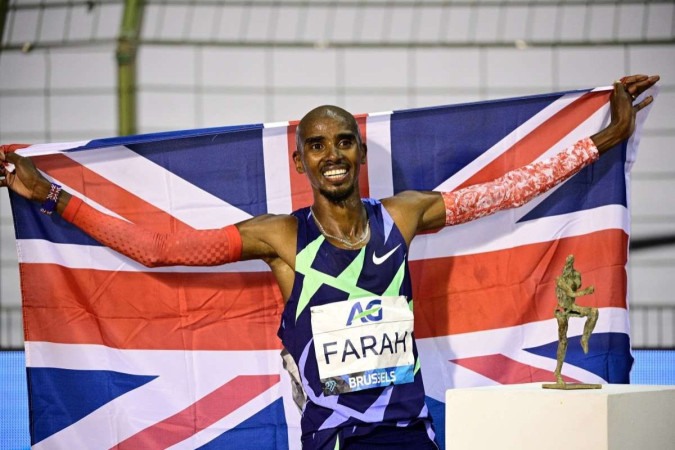Published on 07/12/2022 08:41

(Credit: MARTIN BUREAU/AFP)
London, UK- Mo Farah, the king of athletics, who was awarded a knight by the Queen of England for his Olympic achievements, revealed in a documentary that he arrived in the UK illegally under a false identity and was later forced to work as a household servant for a family.
“The truth is I’m not what you think I am. Most people know me as Mo Farah but it’s not true. I was separated from my mother and brought to the UK illegally under the name of another boy named Mo Farah,” the four-time Olympic gold medalist explains in an interview It will be shown by the BBC on Wednesday.
Farah, now 39, says in the interview that Mohamed Farah was given the name Mohamed Farah by a woman who forced him to travel to the United Kingdom, explaining that he would meet relatives from Djibouti, an East African country, when he was nine years old.
The athlete, who won the 5,000 and 10,000 meters races at the London 2012 Olympics and Rio 2016, reveals that his real name is Hussein Abdi Kahin. His father was killed in Somalia when he was four years old.
His mother and two brothers live in the breakaway region of Somaliland, which is not recognized by the international community.
– “do not say anything” –
Farah adds: “The truth is that I was born in Somaliland, northern Somalia, with the name Hussein Abdi Kahin. Despite what I have said in the past, my parents did not live in the UK.”
So far, he said he was born in Mogadishu, the capital of Somalia, and came to the UK in 1993, at the age of 10, with his mother and two brothers to join his father as a computer technician.
Upon arriving in the country, the woman who accompanied him took the paper with his relatives’ address, “tore it up and threw it in the trash,” according to Farah. “At that moment, I knew I was going to have problems.”
Farah, the first Briton to win four Olympic titles in track and field, says he was forced to clean the house and take care of other children in a British family if he wanted to “eat something”.
He was told, “If you want to see your family again, don’t say anything.”
“I often lock myself in the bathroom and cry,” he said.
– Teacher’s confidence –
One day, he ended up revealing the truth to his physical education teacher, Alan Watkinson, who noticed his mood swings as he walked the track. Then he went to live in the house of a “friend” mother who “really took care of him”.
“The only language he seemed to understand was physical education and sports,” says Alan Watkinson. “The only thing I could do to get out of this situation was to get out and run,” Farah says.
The professor later applied for British citizenship of the athlete, which he finally received on July 25, 2000.
Mohamed Farah’s lawyers have warned of the danger of withdrawing his British citizenship after revealing “false statements”. The British Home Office announced, on Tuesday, that the Olympic champion will not be judged in the United Kingdom.
A spokesman for the Ministry of the Interior confirmed to AFP that “no legal proceedings will be opened against Sir Mo Farah and that suggesting otherwise is incorrect.”
“We have to build a future where these things don’t exist anymore,” said London Mayor Sadiq Khan, as the British government plans to deport asylum seekers to Rwanda as part of its anti-immigration policy.
Farah returned to Somalia in 2003 and later set up a foundation with his wife to build wells and provide food and medical care in Africa.
“I realized I couldn’t live here, and that if I stayed, I wouldn’t be an athlete,” he explained in 2007, a year after he won the silver medal in the 5,000m at the European Championships.
A six-time world champion, he became a big star in the UK, especially after the 2012 London Olympics double, which he repeated four years later in Rio. Then he moved on to street racing, but with less success, despite winning the famous Chicago Marathon in 2018.
The athlete explained that it was his four children who pressured him to reveal the truth about his past.
“I hid it for a long time, it was difficult, because you did not want to face it and often my children would ask me questions (…). And you always have an answer for everything, but you don’t have it for it ”, he explains.
“That’s the main reason I’m telling my story now, because I want to feel like I’m a normal person and not someone who’s hiding something,” he says.
Farah, who named her son Hussein in honor of his true identity, concludes: “I often think of the other Muhammad Farah, the boy who took on this identity on that plane, and I hope he is doing well.”

